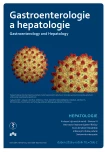Macro-AST as a cause of isolated chronically elevated AST activity – two case reports
Authors:
I. Hejlová 1; J. Komrsková 2; E. Sticová 3; P. Trunečka 4; J. Špičák 1; J. Franeková 2
Authors‘ workplace:
Klinika hepatogastroenterologie, Transplantcentrum, IKEM, Praha
1; Oddělení klinické biochemie, Pracoviště laboratorních metod, Komplement, IKEM, Praha
2; Pracoviště klinické a experimentální patologie, Transplantcentrum, IKEM, Praha
3; Transplantcentrum, IKEM, Praha
4
Published in:
Gastroent Hepatol 2016; 70(2): 138-140
Category:
Hepatology: Case Report
doi:
https://doi.org/10.14735/amgh2016138
Overview
Introduction:
Some enzymes, e.g., aspartate aminotransferase (AST), can form high molecular mass complexes, referred to as macro enzymes, which persist in the serum and cause increased serum activity.
Case study:
We describe two cases of isolated chronically elevated AST activity in two young asymptomatic females (20 - and 21-years-old). Both patients denied alcohol consumption, use of medication, or increased muscle activity. ALT activity and other initial laboratory studies were normal. Detailed investigation did not reveal any disease of liver, muscles, heart, or thyroid gland, or the presence of celiac disease. This led us to consider the possibility of macro-AST. A polyethylene glycol precipitation assay was performed, which revealed 92% and 79% polyethylene glycol precipitable activity, confirming the presence of macro-AST in both patients.
Conclusion:
Isolated chronically elevated AST activity may be caused by the presence of macro-AST. Confirmation of macro-AST positivity may help avoid expensive and invasive investigations.
Key words:
aspartate aminotransferase – AST – macro-AST – macroenzymes
The authors declare they have no potential conflicts of interest concerning drugs, products, or services used in the study.
The Editorial Board declares that the manuscript met the ICMJE „uniform requirements“ for biomedical papers.
Submitted:
3. 12. 2015
Accepted:
26. 1. 2016
Sources
1. Pratt DS, Kaplan MM. Evaluation of abnormal liver-enzyme results in asymptomatic patients. N Engl J Med 2000; 342(17): 1266–1271.
2. Caropreso M, Fortunato G, Lenta S et al. Prevalence and long-term course of macro-aspartate aminotransferase in children. J Pediatr 2009; 154(5): 744–748. doi: 10.1016/j.jpeds.2008.11.010.
3. Lee M, Vajro P, Keeffe EB. Isolated aspartate aminotransferase elevation: think macro-AST. Dig Dis Sci 2011; 56(2): 311–313.
4. Davidson DF, Watson DJ. Macroenzyme detection by polyethylene glycol precipitation. Ann Clin Biochem 2003; 40 (5): 514–520.
5. Manns MP, Czaja AJ, Gorham JD et al. Diagnosis and management of autoimmune hepatitis. Hepatology 2010; 51(6): 2193–2213. doi: 10.1002/hep.23584.
6. Moriyama T, Tamura S, Nakano K et al. Laboratory and clinical features of abnormal macroenzymes found in human sera. Biochim Biophys Acta 2015; 1854(6): 658–667. doi: 10.1016/j.bbapap.2014.10.015.
7. Patteet L, Simoens M, Piqueur M et al. Laboratory detection of macro-aspartate aminotransferase: case report and evaluation of the PEG-precipitation method. Clin Biochem 2012; 45(9): 691–693. doi: 10.1016/j.clinbiochem.2012.03.004.
8. Briani C, Zaninotto M, Forni M et al. Macroenzymes: too often overlooked. J Hepatol 2003; 38(1): 119.
9. Moriyama T, Nobuoka M, Makino M. Incidence and properties of aspartate aminotransferase-immunoglobulin complexes in patients with a high serum aspartate to alanine aminotransferase ratio. Clin Chim Acta 1990; 190(1–2): 47–56.
10. Smolka V, Kamarýt J, Hrabincová E et al. Makroforma enzymu aspartátaminotransferázy u zdravých dětí jako benigní příčina vysoké sérové aktivity AST. Čs Pediat 1998; 53(3): 152–155.
11. Orlando R, Carbone A, Lirussi F. Macro-aspartate aminotransferase (macro-AST). A 12-year follow-up study in a young female. Eur J Gastroenterol Hepatol 2003; 15(12): 1371–1373.
12. Yu Z, Wang Y, Feng L et al. Macro-aspartate aminotransferase: two-year follow-up of three patients in China. Dig Dis Sci 2014; 59(1): 224–226. doi: 10.1007/s10620-013-2856-x.
13. Slabík D, Freiberger T, Tomašovičová Z et al. Makrokomplex AST jako příčina nejasné elevace sérové aktivity AST. Klin Biochem Metab 2004; 12(33): 42–45.
Labels
Paediatric gastroenterology Gastroenterology and hepatology SurgeryArticle was published in
Gastroenterology and Hepatology

2016 Issue 2
- Possibilities of Using Metamizole in the Treatment of Acute Primary Headaches
- Metamizole vs. Tramadol in Postoperative Analgesia
- Spasmolytic Effect of Metamizole
- Metamizole at a Glance and in Practice – Effective Non-Opioid Analgesic for All Ages
- The Importance of Limosilactobacillus reuteri in Administration to Diabetics with Gingivitis
-
All articles in this issue
- Hepatology
- Chronically elevated levels of liver enzymes
- Methods for non-invasive determination of advancement of liver fibrosis
- Bleeding from varices – viewpoint on therapy after Baveno VI
- Infections in liver cirrhosis – our experience
- Macro-AST as a cause of isolated chronically elevated AST activity – two case reports
- Granulomatous hepatitis as a rare therapeutic complication
- Severe life-threatening parasitic liver disease complicated by dissemination to the lungs
- Sartan associated enteropathy – case report and review of the literature
- The role of calcium and vitamin D in the prevention of colorectal cancer
- 11th Congress of ECCO, Amsterdam, The Netherlands
-
20th Gastroenterology and Hepatology days in Hradec Králové
and 10th International endoscopy workshop - The selection from international journals
- Eziclen® – reliable method for cleaning the bowel before the colonoscopic examination
- Gastroenterology and Hepatology
- Journal archive
- Current issue
- About the journal
Most read in this issue
- Eziclen® – reliable method for cleaning the bowel before the colonoscopic examination
- Chronically elevated levels of liver enzymes
- Methods for non-invasive determination of advancement of liver fibrosis
- Macro-AST as a cause of isolated chronically elevated AST activity – two case reports
